Saturn 1B rocket being removed from Alabama Welcome Center

The massive Saturn 1B rocket is an iconic reminder of Alabama’s role in the space race and bringing man to the Moon. The rocket at the Alabama Welcome Center has welcomed visitors from Tennessee and points north for 44 years, but no more. The rocket is now being taken down. Efforts by the State Legislature to keep the rocket ultimately failed, and NASA, which still owns the rocket, is taking it down because of its deteriorating condition. “The Saturn 1B rocket is an iconic symbol for the entire state,” State Senator Tom Butler (R-Madison) told WSFA News in Montgomery. “I think it makes for a very sad day to such a symbol taken down.” Butler had been the author of legislation to save the rocket. That legislation passed the Alabama Senate and was signed by Alabama Governor Kay Ivey. However, the rocket is owned by the Space and Rocket Center, and they made the decision to take it down. The 224-foot-tall Saturn 1B Rocket was built in the 1960s to take the Apollo module into space. The Saturn 1B rocket is a more powerful 1967 upgrade of the original Saturn 1. Three astronauts were killed in a dress rehearsal of the Saturn 1B mission – later renamed as Apollo 1. All the moon missions were carried into space by Saturn rockets. The Marshall Space Flight Center in Huntsville designed, tested, and built the Saturn rockets. The Saturns were the most powerful rockets ever made until the Space Launch System (SLS) currently being prepped to take man back to the Moon after a decades-long absence. It will take 3 to 5 weeks to fully disassemble the rocket. To connect with the author of this story or to comment, email brandonmreporter@gmail.com.
Senate rejects due process for student discipline bill
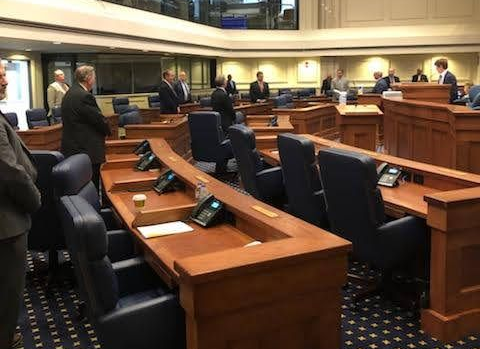
On Tuesday, the Alabama Senate voted to reject controversial legislation that would have set up a formal due process standard for disciplining a child in an Alabama public school. Senate Bill 181 (SB181) is sponsored by State Senator Rodger Smitherman. The synopsis states, “This bill would provide a uniform statewide system of procedural due process protections relating to the suspension and expulsion of public school students for violating the student code of conduct or state law. This bill would also provide for the adoption of any necessary rules to implement this act by the State Board of Education.” The bill, after being amended, was voted down rapidly with no floor debate. Smitherman then took an hour of time during the next bill to voice his unhappiness with the Senate’s rejection of his legislation. “Last year, we passed the same bill out of the Senate almost unanimous,” Smitherman said. Last year the legislation failed in the House of Representatives. The legislation was staunchly opposed by Alabama School Superintendents and other education supporters. “It is obvious they did a good lobbying effort among our colleagues to kill the bill,” Smitherman said. “The school superintendents, they have elevated their power now to the point that they can convince all but eleven people that these children do not need due process.” “Those little children ain’t going to have anybody standing out there (in the Statehouse halls) talking for them,” Smitherman said. “Who is getting suspended? Who is getting so many days? and for what reason?” Smitherman said heavily, implying that school systems target Black students, particularly males, for discipline. “The teacher is the judge, jury, and executioner,” Smitherman said. “They (the accused children) don’t get the first benefit of the doubt,” Smitherman said. “They are guilty until they are proved innocent.” The most controversial element of Smitherman’s legislation was giving a student the right to face their accuser. The Greene County Superintendent testified before committee that students fear retaliation by other students, so a student who might tell a teacher that another child has a gun in school; would not come forward if her identity was revealed. Smitherman also opposes the mandatory kindergarten bill that would force a child who did not attend kindergarten as a five-year-old to be denied admission into first grade. He also opposes the Alabama Literacy Act provision that a child that can’t read at grade level by the end of the third grade will have to repeat third grade. “First, they want to hold them back in the first grade,” Smitherman said. “If they don’t get them there, then they want to hold them back in third grade. If they don’t get them there, then they use these discipline policies to suspend or expel them.” “They ain’t going to stay in school when they are 21,” Smitherman said. “If they don’t get an education, they ain’t gonna get a job. If they have no job, they can’t eat.” Smitherman called the schools a “pipeline to prison.” The Legislature is also concerned with criminal gangs operating within many Alabama schools. The Senate voted down SB181 11 to 20. Jabo Waggoner, Tom Butler, Arthur Orr, and Greg Reed were the only Republicans to vote for the bill. Billy Beasley was the only Democrat who voted against the legislation. The controversial legislation appears to be dead for this session. To connect with the author of this story or to comment, email brandonmreporter@gmail.com.
Twelve more bills to watch introduced in the legislative session

The 2023 Alabama Regular Legislative Session is almost half over. Tuesday will be legislative day 14. To this point, State Legislators have introduced 618 bills in the current legislative session. Alabama Today has been monitoring bills as they are introduced. Here are twelve of the most recently introduced bills to watch. House Bill 370 (HB370) is sponsored by Representative John Rogers. According to the synopsis, HB370 “would require the Alabama State Law Enforcement Agency to establish and maintain a database that includes a list of individuals with communication disabilities or disabilities that can impair communications, to be available to law enforcement officers. This bill would require the Alabama Department of Public Health to develop a form for individuals to voluntarily register for inclusion in the database.” Senate Bill 237 (SB237) is sponsored by Senator Tom Butler. According to the synopsis, “Under existing law, the Alabama Memorial Preservation Act of 2017 prohibits architecturally significant buildings, memorial buildings, memorial streets, and monuments that are located on public property and have been so situated for 40 or more years from being relocated, removed, altered, renamed, or otherwise disturbed unless the Committee on Alabama Monument Protection grants a waiver, and provides penalties for violations. This bill would require a controlling governmental entity that replaces a memorial building to maintain the original name or erect a marker memorializing the name. This bill would provide that a petition for waiver is deemed denied if the Committee on Alabama Monument Protection fails to act on an application for waiver within 90 days. This bill would revise the penalties for violations and would authorize the Attorney General to commence a civil action. This bill would also require the Alabama State Council on the Arts to oversee the design, construction, and installation of a replica of the Saturn 1B Rocket, previously located at the I-65 Ardmore Welcome Center in Elkmont, Alabama, at the most northern I-65 rest stop in the state.” House Bill 364 (HB364) is sponsored by State Rep. Steve Hurst. HB364 would require a public K-12 school or a local board of education to accept cash and any other form of payment of its choosing for admission to school-sponsored sporting events that are open to the public. Some venues have gone to credit card payments only during the COVID-19 pandemic. House Bill 354 (HB354) is sponsored by State Rep. Mack Butler. HB354 “would provide that classroom instruction or discussions related to gender identity or sexual orientation may not be provided to public school students in kindergarten through eighth grade or to public school students in a manner that is not age or developmentally appropriate. This bill would require the State Board of Education to adopt procedures for notifying a student’s parent if there is a change in the student’s services or monitoring relating to the student’s mental, emotional, or physical health and would prohibit local boards of education from adopting policies to the contrary. This bill would require each local board of education, at the beginning of each school year, to notify parents of the health care services available to students and allow parents to opt their child out of any health care service.” Senate Bill 224 (SB224) is sponsored by Sen. Vivian Figures. According to the synopsis, “Under existing law, the crime of transmitting obscene material to a child by computer is a Class B felony. This bill would clarify that for the purpose of this crime, a child is a person who is under 16 years of age. Under existing law, a person commits the crime of distributing a private image if he or she knowingly posts, emails, texts, transmits, or otherwise distributes a private image with the intent to harass, threaten, coerce, or intimidate the person depicted in certain circumstances. This bill would clarify that a criminal proceeding for a violation of distributing a private image could be brought in any county in which any part of the crime took place, in the county of residence of the victim, or any county where the image was received. Also, under existing law, a violation of incest is a Class C felony. This bill would provide that a violation of incest when the victim is under 16 years of age is a Class A felony. Also, under existing law, a person may not be convicted of the crime of incest or of an attempt to commit incest unless there is corroborated testimony. This bill would remove the requirement of corroborated testimony.” Senate Bill 234 (SB234) is a state constitutional amendment by Sen. Merika Coleman. SB234 would end the state’s four percent sales tax on groceries but would replace the lost revenue by ending the state’s allowing income taxpayers to deduct their federal income tax. A family of four who spends $110 a week on groceries would save $229 on the reduced sales tax on groceries. With a typical household taxable income of $54,062, they pay $4,726 in federal income taxes. Currently, they would deduct that from their state-taxable income. If SB234 passes and they lose that deduction, they would pay $281 in additional Alabama income taxes. In this example, that family would pay $52 more in taxes. A low-income family or a retired couple with no investment income would come out ahead by not having to pay the grocery tax. A high-income family will pay more taxes in this scenario if SB234 becomes law. Senate Bill 232 (SB232) is sponsored by Sen. Chris Elliott. SB232 would authorize peer-to-peer car-sharing programs, which are business platforms that connect vehicle owners with drivers, to enable the sharing of vehicles for financial consideration in this state. House Bill 342 (HB342) is sponsored by Rep. Susan Dubose. The bill states, “Under existing law, the State Superintendent of Education is authorized to issue professional educator certificates to qualified individuals who complete an alternative teacher preparation program offered by an approved alternative teacher education preparation organization. This bill would provide additional requirements for programs to provide alternative certifications for educators.” House Bill 339 (HB339) is sponsored by Rep. Chris Pringle. The bill states, “Under existing law, the second or runoff
Senate Committee advances legislation to allow some social workers to diagnose mental illness
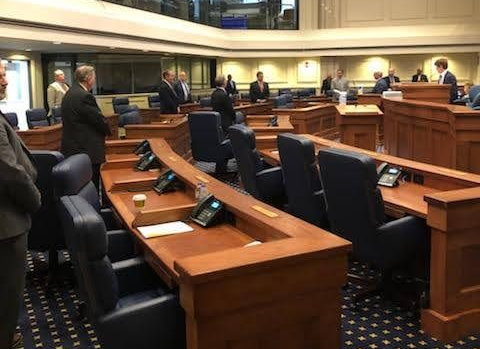
The Alabama Senate State Government Affairs Committee voted to advance legislation allowing certain highly trained social workers to diagnose mental illnesses. House Bill 56 (HB56) is sponsored by State Representative Frances Holk-Jones. HB56 passed in the House 104 to 1. Holk-Jones explained that “Alabama is currently the only state that does not allow” these highly trained social workers to diagnose mental illness. “We are losing these social workers to other states,” Holk-Jones said. “This allows people to get diagnosed and treatment without traveling to see a medical professional,” Holk-Jones continued. Holk-Jones said that this would also enable people to get treatment via telehealth. Sen. Dan Roberts asked, “Is this the same bill that Senator Coleman Madison had that we passed out?” Holk-Jones said yes. The Senate version is SB109. SB109 has passed the Senate and has been referred to the House Health Committee. Sen. Robert Stewart said, “I want to say that I have a therapist. He is out of Maryland.” Stewart expressed his support for the bill and telehealth. Sen. Merika Coleman asked, “Has there been any pushback at all?” Holk-Jones answered, “No.” State Sen. Tom Butler chairs the Senate State Governmental Affairs Committee. The legislation expands the scope of practice of a licensed independent clinical social worker, including the authority to diagnose and develop treatment plans. “The scope of practice does not include the diagnosis, treatment, or provision of advice to a client for problems or complaints relating to conditions outside the boundaries of the practice of social work.” The legislation states that no individual may engage in the independent clinical practice of social work unless they satisfy all of the following: (1) Licensed is licensed under this chapter as a licensed independent clinical social worker; and. (2) Has a doctorate or master’s degree from a school of social work approved, accredited, or in candidacy granted by the Council on Social Work Education; and. (3) Has had two years of full-time or three years of part-time postgraduate experience under appropriate supervision in the specified social work method or four years of full-time or five years of part-time postgraduate experience under appropriate supervision in the specialty in which the applicant will practice. (4) Has passed an examination prepared by the board for this purpose; except that prior to the time that an examination is prepared by the board for this purpose, no person individual who otherwise meets the requirements of this section will be prohibited from engaging in the private independent practice of social work; and. (5) Has been issued by mail a certified letter of certification stating his or her qualification for private independent practice by the board; and. (6) Has paid an initial certification fee set by the board. “The terms diagnose and treatment, whether considered in isolation or in conjunction with the rules of the board, may not be construed to permit the performance of any act which a licensed clinical social worker is not educated or trained to perform including, but not limited to, any of the following: (1) Administering and interpreting psychological tests or intellectual, neuropsychological, personality, or projective instruments. (2) Admitting any individual to a hospital for treatment of any condition that is outside the boundaries of the practice of social work, as provided in subsection (b). (3) Treating any individual in a hospital setting without medical supervision. (4) Prescribing medicinal drugs. (5) Authorizing clinical laboratory procedures or radiological procedures. (6) Using electroconvulsive therapy. The state of Alabama has a significant shortage of mental health professionals. The Committee voted to give HB56 a favorable report without amendment. It could be considered by the full Senate as early as Tuesday. Through Friday, 618 bills have been introduced in the legislative session. Tuesday will be day 14 of the 2023 Alabama Regular Legislative Session. To connect with the author of this story or to comment, email brandonmreporter@gmail.com.
State Senate Committee advances election integrity bills
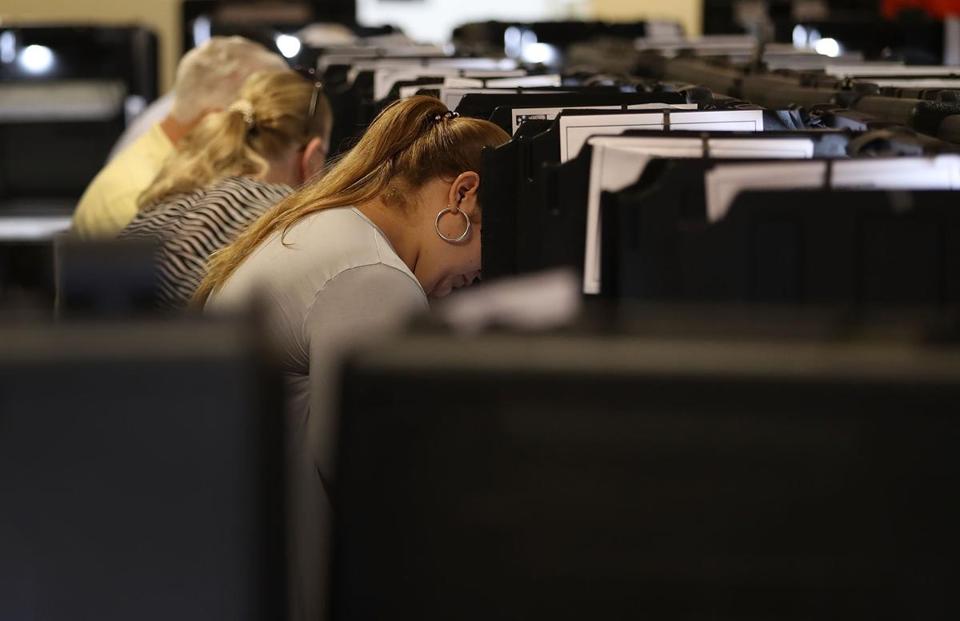
On Wednesday, the Alabama Senate State Governmental Affairs Committee advanced two bills designed to protect the integrity of Alabama elections. Both bills are sponsored by State Sen. Clyde Chambliss. Senate Bill 9 (SB9) would require that the state’s electronic voting counting system must require the use of a paper ballot that is marked and inspected by the voter prior to being cast and counted. The second bill, SB 10, prohibits the use of electronic vote counting systems that are capable of connecting to the Internet or cell phone networks or that possess modem technology. The State Government Affairs Committee is chaired by State Sen. Tom Butler. “We had both of these two bills last session,” Butler said. “They simply put into law things that we already do,” Chambliss said. “Paper ballots for voting. We do that, but it is not currently in the law.” State Sen. Dan Roberts motioned to give SB9 a favorable report. The Committee voted unanimously to give SB9 a favorable report. “This deals with internet modems on voting machines,” Chambliss said of SB10. “Obviously, if they have those connections, people can hack into the system and possibly influence the vote count.” “This puts our current practice into law,” Chambliss said. “Do we have problems with electronic voting in Alabama?” asked Sen. Merika Coleman. “I don’t know,” answered Chambliss. “This is trying to be proactive.” “We want to make it illegal for anybody to connect the electronic vote counting machines to the internet,” Chambliss explained. “If we had problems with voting, it is with the absentee ballot process,” Coleman said. “I was on the Electronic Voting Machines Task Force, and I started asking questions,” Chambliss said. “It is not policy to have modems on the counting machines. Policy is not strong enough for me. I want to put this into law. This is a bill that is looking forward. I don’t want to be reactionary.” “We have electronic vote counting machines. We do not have electronic voting,” Chambliss explained. “You have a point,” said Sen. Linda Coleman-Madison. “This is a trust issue. I have some trust issues myself. This is a good bill.” Sen. Robert Stewart asked if this legislation would prevent the state from adopting new technology. “It does not prevent changing to new technology, but it would prohibit a modem being in that machine,” Chambliss said. SB10 was given a favorable report on an 11 to 0 vote. Both bills are supported by Alabama Secretary of State Wes Allen, who was present to show his support and answer any questions the committee members might have. The legislation can be considered by the full Senate as soon as Tuesday, April 4, when the 2023 Alabama Regular Legislative Session resumes. To connect with the author of this story or to comment, email brandonmreporter@gmail.com.
Seven State Senate seat races to watch
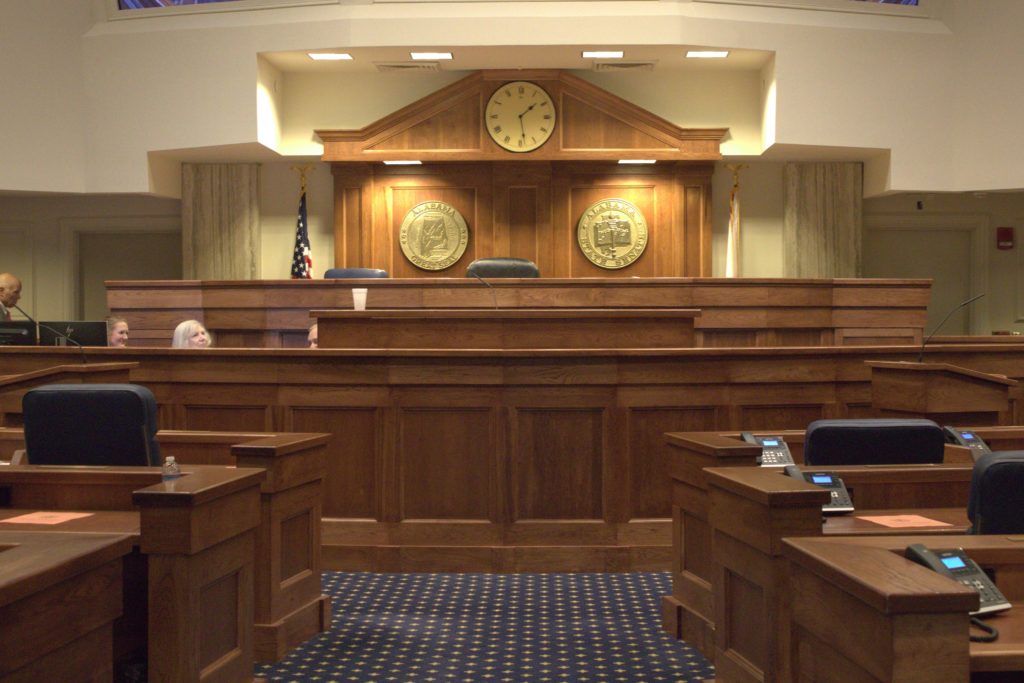
All 35 State Senate seats are up for grabs in the November 8 general election. Republicans hold a 27 to 8 margin over Democrats in the current makeup of the Alabama Senate. The Alabama Republican Party is running candidates in 29 seats. The GOP is defending all of the 27 seats they currently hold and are running candidates in two districts currently held by Democrats. Alabama Democrats are defending the eight seats they currently hold and are challenging the GOP in six districts currently held by Republicans. Libertarians currently hold no seats in the Alabama Senate but are running twelve candidates in State Senate races. There are a number of contested State Senate races on the November ballot. These are the seven races with the most chance of becoming interesting. Democrat Lisa Ward is challenging Republican incumbent State Sen. Gerald Allen in Senate District 21. Both of these candidates are well known in the Tuscaloosa area. Allen has represented the district for three terms and served in the Alabama House of Representatives before that. Ward is a former city councilwoman who is very active in the community. According to filings with the Alabama Secretary of State’s office, Allen has a $204,872.68 campaign account balance entering September, which includes August contributions of $8,250. Ward, the challenger, meanwhile raised $23,149.76 in August and has a cash balance of $31,968.94 entering September. Neither faced a primary opponent. Democrat Kim Lewis versus Republican incumbent State Sen. Tom Butler in Senate District 2. Butler has represented Madison County in the legislature for parts of five decades, but this is one of the fastest growing areas in the state, and there are thousands of new people that bring different politics with them to the area. Lewis is hoping that an increasingly purple Madison County will result in a win. Butler was pushed hard in the Republican primary by former State Sen. Bill Holtzclaw. Butler raised $44,500 in the month of August and enters September with $38,166.63. Lewis raised $7,830 in August and comes into September with $27,859.70. In Senate District 33, incumbent Democratic Sen. Vivian Figures faces Republican challenger Pete Riehm. This has been a very safe Democratic district consisting of the poorest parts of Mobile as well as Mobile County suburbs like Prichard, but redistricting meant that the new district now goes deep into Baldwin County and picked up the very prosperous and heavily Republican community of Spanish Fort. This district went from very blue to purple thanks to the legislature’s redistricting and efforts to “unpack” Black voters from majority-minority districts. Is it purple enough for a Republican to take it away from the Democrats? That is for the voters to decide on November 8. Sen. Figures raised $31,500 in the month of August to enter September with $110,497.02. Riehm had contributions of $19,577.54 in August and enters September with $60,911.31. Democrat Sherri Lewis versus Republican Jay Hovey in Senate District 27. Hovey, an Auburn City Councilman, just narrowly defeated incumbent Tom Whatley (R-Auburn) in a heavily contested GOP primary. Hovey, who has the challenge of unifying Republicans, raised $85,500 in contributions in August to enter September with a cash balance of $70,074.17. Reese meanwhile raised $1,806.20 in August to bring a total of $2,703.33 into the month of September. Senate District 23 – here, there are three candidates vying for the open seat formerly held by State Sen. Malika Sanders-Fortier, who vacated the seat in an unsuccessful bid for governor. Democrat Robert Lee Stewart narrowly defeated former State Sen. Hank Sanders in a hard-fought Democratic primary runoff in June. Stewart faces both a Republican in Michael Nimmer and a Libertarian in Portia Stephens. Stewart raised $16,987 in August to bring $17,872.84 into September. The Libertarian, Stephens, reported raising $2,060 in August to finish the month with $6,285 in cash on hand. The Republican, Nimmer, has not filed a campaign finance report. Alabama does not have general election runoffs, so when there are multiple candidates, the candidate with the most votes wins even if they got less than half of the votes. There is another three-way contest in Senate District 29. There, incumbent Republican Sen. Donnie Chesteen (R-Dothan) faces both Democrat Nathan “Nate” Mathis and Libertarian Floyd “Pete” McBroom. Matthis reported raising no money in August, but he has $5,719.36 in cash on hand. McBroom has not filed a campaign finance report with the Secretary of State’s office yet. The incumbent, Chesteen, raised $25,500 in August to enter September with $327,660.86. In Senate District 12, Republican Keith Kelley is battling Democrat David McCullars for the open seat currently held by Sen. Del Marsh. Kelley raised $29,658.24 in August and has $65,102.13 in cash on hand. McCullars only raised $265 in the month of August and entered the month of September with $4,377.15 in cash on hand. Kelley had a hard-fought Republican primary. This is a district that has given Marsh a close call in the 2014 general election. In other contested Alabama Senate races · SD3 incumbent Arthur Orr (R-Decatur) faces Libertarian Rick Chandler · SD4 incumbent Garlan Gudger (R-Cullman) faces Libertarian Jacob Marlow · SD6 incumbent Larry Stutts (R-Sheffield) faces Libertarian Kyle Richard-Garrison · SD7 incumbent Sam Givhan (R-Huntsville) faces Democrat Korey Wilson · SD15 incumbent Dan Roberts (R-Mountain Brook) faces Libertarian Michael Crump · SD17 incumbent Shay Shelnutt (R-Trussville) faces Libertarian John Fortenberry · SD24 incumbent Bobby Singleton (D-Greensboro) faces Libertarian Richard Benderson · SD25 incumbent Will Barfoot (R-Montgomery) versus Libertarian Louie Woolbright · SD28 incumbent Billy Beasley (D-Clayton) faces Libertarian David Boatwright · SD35 incumbent David Sessions (R-Grand Bay) faces Libertarian Clifton Hudson Republican incumbents Tim Melson, Greg Reed, Steve Livingston, Clay Scofield, Andrew Jones, Randy Price, April Weaver, Jabo Waggoner, Greg Albritton, Clyde Chambliss, Chris Elliott, and Jack Williams are all running unopposed. Republican newcomers Lance Bell in SD11 and Josh Carnley in SD31 are also unopposed in the general election. Democratic incumbents Rodger Smitherman, Linda Coleman-Madison, and Kirk Hatcher are all also unopposed in the general election. State Rep. Merika Coleman is unopposed in SD19, which is being vacated by the retirement of Priscilla Dunn (D-Bessemer). In 2022 Republican candidates in Alabama have received $44,321,108.97 in contributions. Political Action Committees have received $17,846,761.05. Democratic candidates have received $6,629,199.43, and all other candidates have received just $111,950.87. The general
The NRA Political Victory Fund announces primary endorsements

The NRA Political Victory Fund (NRA-PVF) has announced its endorsements for the May 24 primary in Alabama. The NRA-PVF is NRA’s political action committee. The NRA-PVF ranks political candidates – irrespective of party affiliation – based on voting records, public statements, and their responses to an NRA-PVF questionnaire. Mo Brooks received the endorsement and A rating for the U.S. Senate seat and incumbent Rep. Mike Rogers got an A rating and was endorsed for the U.S. House of Representatives. For the governor’s race, the group gave an A rating and endorsement to incumbent Kay Ivey. Incumbents continued to take the top spots in the Attorney General, State Senate, and House of Representatives elections. AG Steve Marshall received an A rating along with incumbent State Senators Tim Melson (Dist. 1), Tom Butler (Dist. 2), Steve Livingston (Dist. 8), Randy Price (Dist. 13), Dan Roberts (Dist. 15), Shay Shelnutt (Dist.17), Tom Whatley (Dist. 27), and Mike Jones (Dist.31). For the State House of Reps., the following incumbents received an A rating and endorsement: Phillip Pettus (Dist. 1), Parker Moore (Dist. 4), Proncey Robertson (Dist. 7), Tim Wadsworth (Dist. 14), Tommy Hanes (Dist. 23), Nathaniel Ledbetter (Dist. 24), Gil Isbell (Dist. 28), Debbie Wood (Dist. 38), Ginny Shaver (Dist. 39), Dickie Drake (Dist. 45), Jim Carnes (Dist. 48), Brent Easterbrook (Dist. 65), Jeff Sorrells (Dist. 87), Will Dismukes (Dist. 88), Rhett Marques (Dist. 91), and Matt Simpson (Dist. 96). State House of Rep. candidates that are not incumbents that received an A rating and an endorsement include Michael Hart (Dist. 49) and Troy Stubbs (Dist. 31). For the Sheriff’s elections, the following candidates received an A rating and endorsement: Max Sanders (Lawrence County), Joshua McLaughlin (Limestone County), Eric Balentine (Colbert County), and Matt Gentry (Cullman County).
Steve Flowers: Congressional lines and Congressmen will remain the same

For several years leading up to the 2010 Census count, the national projections were that Alabama would lose one of our seven congressional districts and drop to six. When the count was taken, we surprised ourselves and the nation and kept our seven seats in the United States Congress. Therefore, the legislature’s task in drawing our seven congressional districts was relatively easy. Except for some tweaking here and there due to growth in Madison, Limestone, Lee, Shelby, and especially Baldwin counties, and the loss of population in the Black Belt, our congressional district lines were kept basically the same as they have been for the past few decades. We essentially have six of our seven districts that are safe Republican seats. We have one dedicated majority minority African American Democratic Congressional District. That Democratic seat is held by Congresswoman Terri Sewell. She has been in that seat for over a decade and has become a respected leader in the Democratic House leadership. The Democrats are in the majority, which makes her a powerful member of the House. However, most political experts and polling indicate that this year’s election will bring a swing of 30 or more Republican seat pickups or takeovers, thus making the Republicans the majority party. This will be beneficial for Alabama since six of our seven seats are held by Republicans. It will be particularly beneficial to folks in the fourth district, who have Robert Aderholt (R-Haleyville) as their Congressman. Aderholt is the most senior member of our delegation and is the ranking Republican on the House Appropriation Committee. Congressman Mike Rogers (R-Anniston) is also gaining ground in seniority. He is a ranking member of the Armed Services Committee. Congressman Gary Palmer (R-Jefferson) represents the suburban areas of metro-Jefferson, Hoover, and Shelby. It is considered one of the most Republican House districts in America. We have two freshmen Republican Congressmen who are finishing their first two years in the House. Jerry Carl (R-Mobile) represents the coastal first district of basically Mobile and Baldwin Counties. He has taken to Congress like a duck to water. Barry Moore (R-Enterprise) represents the second district made up of the Wiregrass and the fast-growing Pike Road area of Montgomery, as well as the populous counties of Autauga and Elmore. All six of the aforementioned incumbents will be reelected without opposition. The only excitement in Congressional politics in the Heart of Dixie will play out in the fifth district. This Huntsville-Tennessee Valley seat is currently held by Mo Brooks, who has opted to run for the U.S. Senate, thus leaving a seldom seen open congressional seat contest. There are six Republicans vying for this open fifth district seat. The contestants are Dale Strong, Paul Sanford, Casey Wardynski, Harrison Wright, Andy Blalock, and John Roberts. Madison County Commission Chairman Dale Strong appears to be the strongest candidate. He is far outdistancing the field in polling and fundraising. Some say that he could eclipse the field without a runoff. The most ardent challengers will be former State Senator Paul Sanford and former Huntsville City School Superintendent Casey Wardynski. Dr. Wardynski has done a good job fundraising. There will be a large turnout in this congressional race. In fact, this Huntsville-Madison-Limestone Tennessee Valley area of the state will more than likely have the largest percentage turnout in the state. Not only is there an open congressional seat, but Mo Brooks is the local candidate for the open U.S. Senate Seat, and popular, incumbent Republican state school board member, Wayne Reynolds, will also be on the ballot with token opposition. In addition, the only hotly contested Republican State Senate race between Tom Butler and Bill Holtzclaw is in the Madison-Limestone area. There are also three open hotly contested State House races, including filling the seats of Speaker Mac McCutcheon and veteran House member Howard Sanderford. There is also a hotly contested open sheriff’s race in Limestone County. Furthermore, the phantom candidate for the U.S. Senate, Mike Durant, claims Huntsville as his home. All of these ingredients are a recipe for a larger turnout in the Tennessee Valley than the rest of the state on May 24. The Congressional lines and six of seven congressmen will remain the same for this 2022 election cycle. However, hold the phone. The federal courts could change that for 2024. See you next week. Steve Flowers is Alabama’s leading political columnist. His weekly column appears in over 60 Alabama newspapers. Steve served 16 years in the state legislature. Steve may be reached at: www.steveflowers.us.
Kay Ivey signs HB 391, providing tax relief to small businesses
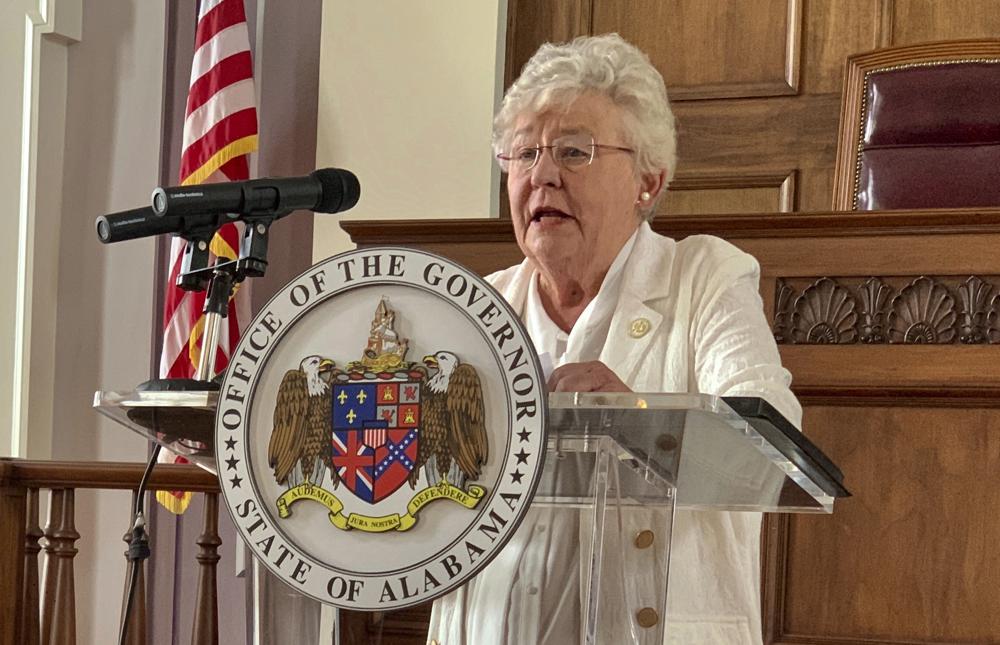
On Wednesday Gov. Kay Ivey signed House Bill 391, a bill that will eliminate the business privilege tax for Alabama small businesses and will provide relief to more than 230,000 small businesses. The bill was sponsored by Rep. Steve Clouse and Sen. Tom Butler. Currently, the Alabama Business Privilege Tax levies a minimum of $100 annually on corporations, limited liability entities, and other businesses in Alabama. The tax remains due every registered year until the entity is legally dissolved, regardless of whether or not such entity is actively doing business in Alabama. In a press release, Ivey emphasized the need to provide relief for small businesses. “Alabama’s small businesses are the soul of our economy, and as long as I am your governor, I will continue to be a champion for these hardworking men and women. We are providing real relief to our small businesses,” stated Governor Ivey. “I commend Chairman Clouse and Senator Butler for their leadership and the Alabama Legislature for their work to support our small businesses. This will go a long way in providing support for some 230,000 small businesses for years to come.” Ivey commented on Twitter, “I’m proud to sign HB 391, providing relief from the business privilege tax for 230,000+ AL small businesses. Small businesses are the would of our economy, & as long as I’m your governor, I’ll continue to be a champion for these hardworking men & women.” The exemption is projected to save the state’s small businesses an estimated $23 million a year. The law cuts the $100 minimum business privilege tax in half to $50 for small businesses in 2023, and it completely exempts small businesses from the minimum tax beginning in 2024.
Steve Flowers: Incumbency reigns supreme in State Senate

Being an incumbent state senator in Alabama is like owning that seat. The level of re-electability odds is probably better than that of an incumbent congressman, which is about the same as being elected to a seat in the Russian Communist Politburo. Being a freshman state senator in Alabama is a more powerful position than being a freshman U.S. congressman, especially if you want to affect public policy. Many times, a 50-year old, successful person who is interested in seeking a representative role will approach me and seek my advice about running for either a state senate seat or an open congressional seat. I will quickly advise them that as a state senator, you are one of 35, and you immediately have an impact on your first year as a state senator. However, if you win a congressional seat, you are one of 435. Because of the seniority system, it will be 15 years before they know your name in Washington and 25 years before you are chairman of a committee, and then it is time to retire. In the 35-member Alabama Senate, there are 27 Republicans and 8 Democrats – a pretty supermajority for the GOP. Twenty-four of the twenty-seven senate Republicans are running for reelection. Republicans Jimmy Holley, Del Marsh, and Jim McClendon are retiring. These seats will be filled by another Republican. Therefore, when the Senate organizes next January, the 27 to 8 supermajority will remain the same. The lines are drawn to protect incumbents on both sides of the aisle. The Constitution provides the power of the pencil for legislators to draw their own legislative districts. Seventeen of the 24 Republican incumbents have no opposition in the Republican Primary. Of the seven Republican senators who drew a Republican opponent, they only got an opponent the last day of qualifying, and their opposition is token at best. All 24 Republican incumbents will be reelected. If my prognostication is correct, that is a 100% re-electability rate. There are only two GOP incumbents that were first thought to have viable opponents. Tom Whatley, at first blush, was rumored to have a race. However, polling and fundraising reveal he will win easily. The only interesting race may be in the Huntsville area, where incumbent Tom Butler is being challenged by Bill Holtzclaw, who previously served in that senate seat. The rule of incumbency also prevails on the Democratic side of the aisle. There is only one Democratic seat open. Priscilla Dunn holds the post in name only. She has never attended a senate day in Montgomery for this entire quadrennium. The Senate has, in essence, been operating with 34 senators. In actuality, the Democrats have only seven senate seats. There are 150,000 residents of Jefferson County who have had no voice or vote in the Alabama Senate for four years. There are two Democratic House members vying to fill this seat, Merrika Coleman and Louise Alexander. Ms. Coleman is favored to win this open Senate seat. The cadre of leadership on the Democratic side will return, including powers Bobby Singleton, Rodger Smitherman, and Vivian Figures. Hank Sanders will return to represent Selma and the Black Belt after a four-year sabbatical. His daughter was in the seat this last quadrennium. The entire leadership of the Republican-led Senate will return unopposed, including Greg Reed, Jabo Waggoner, Clay Scofield, Arthur Orr, Greg Albritton, Steve Livingston, Gerald Allen, and especially Clyde Chambliss. They will be joined by a superstar freshman class, who will become even more powerful. This class of leaders includes Will Barfoot, Garlan Gudger, April Weaver, Sam Givhan, Donnie Chesteen, and a trio contingency of Baldwin/Mobile senators Chris Elliott, Jack Williams, and David Sessions. Another member of this sterling class, Dan Roberts of Jefferson, has an opponent but will be reelected. The three open Republican seats and one Democratic open seat will give us some interesting senate races to follow. One of, if not the most important ingredients which creates the power of incumbency is the almighty campaign dollar. Money is the mother’s milk of politics. Most of this campaign money comes from Special Interest Political Action Committees. Ninety percent of those special interest dollars go to incumbents. Thus, over 90% of Alabama state senators are reelected. See you next week. Steve Flowers is Alabama’s leading political columnist. His weekly column appears in over 60 Alabama newspapers. He served 16 years in the state legislature. Steve may be reached at: www.steveflowers.us.
Kay Ivey signs six bills, ensuring Alabama as pro-military state

Today, Gov. Kay Ivey signed six bills aimed at making Alabama even more military-friendly. Those bills include Senate Bills 28, 99, 116, 119, 141, and 167. These bills were recommended by the Alabama Military Stability Commission, which is chaired by Lieutenant Governor Will Ainsworth. “Alabama is the most pro-military state in the nation, and I am proud to put my signature on a series of legislation aimed at ensuring that we are even more military-friendly,” stated Ivey. “I commend the work by the Military Stability Commission, chaired by Lieutenant Governor Ainsworth, as well as the members of the Alabama Legislature for passing these important bills.” SB116, sponsored by Sen. Tom Whatley and Rep. Debbie Wood, will help ease the burden of military families moving to Alabama. It allows children of active military members moving to Alabama to enroll in local public schools remotely without being physically present in the state. Three bills, SB99 by Sen. Andrew Jones and Rep. Kenneth Paschal, SB167 by Sen. Shay Shelnutt and Rep. Dickie Drake, and SB141 by Sen. Tom Butler and Rep. Parker Moore, are all aimed at making it easier for military families to find work when relocating to Alabama. Each of the bills allows for greater flexibility in occupational licensing for military spouses. SB28, sponsored by Sen. Tom Butler and Rep. Andy Whitt, would create the Space National Guard within the Alabama National Guard if the federal government creates the Space National Guard. Finally, SB119, sponsored by Sen. Will Barfoot and Rep. Dickie Drake, will expand scholarships provided under the Alabama G.I. and Dependents’ Educational Benefit Act to include in-state and private two-and four-year colleges. “The men and women from across Alabama who serve on the Military Stability Commission understand the important role that our bases and other infrastructure play in keeping the state’s economy strong and jobs growing,” commented Ainsworth. “The bills that the Legislature passed and Governor Ivey signed into law will assist our mission of making Alabama the nation’s friendliest and most welcoming state for active service members, military veterans and their families.”
Mo Brooks applauds passage of occupational licensing reform bills, encourages Kay Ivey to sign them
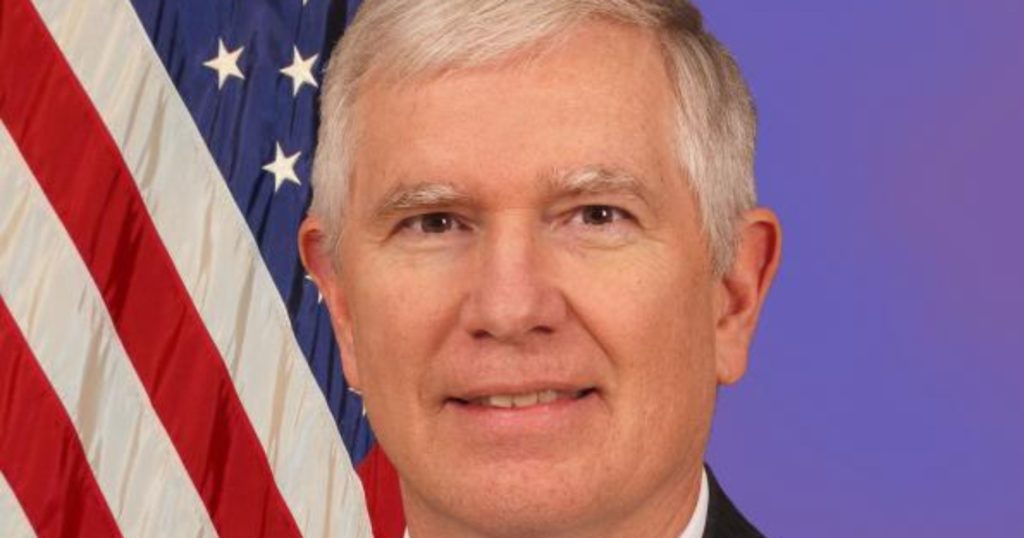
Rep. Mo Brooks has encouraged Gov. Kay Ivey to sign a series of bills passed by the Alabama legislature aimed at easing the transferability of occupational licenses for people who relocate to Alabama. Senate Bills 99, 141, and 167 all help military family members and service members transfer their occupational licenses when moving. “In January of last year, I had a phone conversation with then-Secretary of the Air Force Barbara Barrett about her decision to stand up Space Command H.Q. at Redstone Arsenal. On the call, she explained the Air Force’s analysis of both qualitative and quantitative factors that led to Redstone’s selection. Secretary Barrett emphasized that locating U.S. Space Command at Redstone Arsenal was in the long-term best interest of national security,” Brooks stated in a press release. Brooks continued, “When I discussed with Secretary Barrett where Alabama could improve for future competitions, Secretary Barrett said Alabama needs to improve the transferability of occupational licenses. It’s important to the military that military spouses be able to easily resume their licensed occupations when relocating from one state to another. I encouraged the Alabama legislature to take action to ease occupational license transfers at the time. Alabama legislators listened.” Brooks thanked legislators for their leadership. “Alabama is better off thanks to your leadership on this important issue. These reforms will help Alabama continue to recruit top talent from across America and will support the transition of military families into Alabama from across the country. Thanks to these reforms, Alabama is ready to support standing up Space Command H.Q.,” Brooks concluded. Senate Bill 99 by Sen. Andrew Jones would create the Interstate Counseling Compact, which would establish requirements and authorize licensed professional counselors to practice in Alabama and will provide accommodations for active-duty military and their spouses. Senate Bill 141 by Sen. Tom Butler revises and extends the timeframe for State Licensure Boards to grant various temporary permits for military spouses licensed to practice in other states. Senate Bill 167 by Sen. Shay Shelnutt creates flexibility for practicing occupational therapists in other states to practice in the State of Alabama. The bill provides special accommodations for spouses of active-duty service members and their families. The bill also creates the Occupational Therapy Compact Commission.


